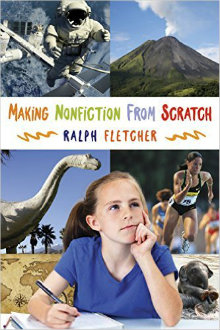Help Students Energize Their Nonfiction Writing
Making Nonfiction from Scratch
By Ralph Fletcher
(Stenhouse 2015 – Learn more)

Nonfiction writing for students often turns into a tedious chore involving spitting back research and information to meet standards. Ralph Fletcher’s Making Nonfiction from Scratch offers strategies and techniques for teachers to guide students’ writing from lifeless sentences to energetic content.

“Nonfiction taps into the sense of wonder and curiosity that are enduring hallmarks of childhood,” he says.
Some of the book’s best features
Fletcher opens the book with strong examples of how “formulaic nonfiction writing” in schools has confined students’ writing, resulting in work that lacks energy and voice. The book’s mentor text examples, such as “Why the Earth is Farting,” demonstrate how a writer entices the reader with a strong lead.
“Classroom Connections” sections throughout the book are especially useful. Practical suggestions in each chapter can be immediately used in the classroom. “Talk Out Your Topic” is one example involving small groups discussing their research and ideas prior to writing. Fletcher also recommends brainstorming and background knowledge to build a solid foundation for strong writing.
Nonfiction writing is often a dry process in the classroom, but Fletcher shows how provisions or “attitudes” can bring it to life. These include:
► Curiosity – Classrooms should encourage students to let their curiosity evolve into their writing.
► Grit and Persistence – Grit is a “buzzword” in education, but Fletcher suggests ways to help writers build stamina.
► Wonderment and Awe – Strong nonfiction writing uses the “beauty and terror” of the world to engage readers.
Using exploratory notebooks
Exploratory Notebooks is a tool suggested by Fletcher to encourage “Type B Writing,” or writing that helps students think their way into an understanding of a topic. This notebook is a place where kids use writing strategies to explore content, including:
- Write down what you already know.
- Generate questions, wonderings, and speculations.
- Chunk out your topic.
- Make a web or visual representation of your topic.
- Collect surprising facts, stats, and information.
- React to what you are learning.
- Make a prediction.
- Collect new words and terms specific to your subject.
- Sift and sort.
- Try a “flashdraft” (narrative version) on the topic.
Breaking the writing process down into purposeful steps encourages writers to gain a deeper understanding of their topic.
Growing nonfiction writers requires us to take risks
Making Nonfiction from Scratch contains practical strategies, techniques, and case studies interspersed with anecdotal humor. Ralph Fletcher’s ideas will challenge and inspire teachers to leave their comfort zone and rethink the purpose of nonfiction writing.
Sandy Wisneski (@stampcat2) is a lead teacher at Catalyst Charter Middle School in Ripon, WI. She is the district Webmaster, tech mentor, yearbook advisor as well as initial educator mentor. Over the past 40 years, she has become certified as a Flat Classroom Teacher and obtained her masters in reading. The summer of 2014 she attended Honeywell Educators @ Space Academy. She enjoys challenging students to “take ownership” for their learning and to be effective digital citizens in the world.






























